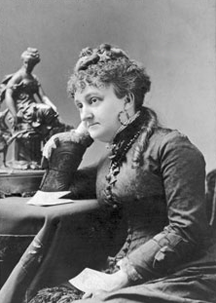Myra Bradwell
| Myra Bradwell | |
|---|---|
 |
|
| Born |
February 12, 1831 Manchester, Vermont, U.S. |
| Died | February 14, 1894 (aged 63) Chicago, Illinois, U.S. |
| Alma mater | Elgin Female Seminary |
Myra Colby Bradwell (February 12, 1831 – February 14, 1894) was a publisher and political activist. She attempted to become the first woman to be admitted to the Illinois bar, but was denied admission by the Illinois Supreme Court and the U.S. Supreme Court. The Illinois Supreme Court finally granted her a law license in Illinois in 1890, and the United States Supreme Court two years later, shortly before her death.
Myra Colby was born on February 12, 1831, in Manchester, Vermont. She was the daughter of Eben Colby and Abigail Willey. She lived in Vermont and Western New York during her childhood. When Bradwell was twelve she moved to Schaumburg, Illinois, with her family. She attended schools in Kenosha, Wisconsin, and later enrolled in Elgin Female Seminary in Illinois. She completed her formal education by age 24. She became a school teacher after she graduated (Jones). In 1852, Myra Colby married James B. Bradwell and she became Myra Colby Bradwell. Two years later they moved to Memphis, Tennessee. James Bradwell was the head of a private school and Myra Bradwell became a teacher in that school. In 1855 they moved to Chicago, where James Bradwell was admitted to the Chicago Bar. He became a successful lawyer, judge, and in 1873 he was elected to the General Assembly.
A few years after marrying James Bradwell, Myra Bradwell started her formal law training when her husband was accepted to the Illinois Bar. There she apprenticed as a lawyer in her husband's office, and assisted him with research and legal writings. Complications arose because of coverture laws, prohibiting married women from holding property, as was even necessary to become a notary public. The Bradwells had four children, and two of them died at an early age. She raised funds to help aid the wounded soldiers during the American Civil War. She was also a member of the Northwestern Sanitary Commission.
In 1868, Bradwell founded the Chicago Legal News, and with her husband's legal help in persuading the Illinois legislature to pass a special law, she was able to serve as both editor and business manager of the Chicago Legal News Company (which also had other publications including stationary and legal forms). Although the paper's offices were destroyed in the Great Chicago Fire of 1871, it continued to publish. The widely-circulated paper published information about court opinions, laws, and court ordinances, and also had a muckraking function--criticizing corruption within the local bar and judiciary and urging railroad regulation. Bradwell also was determined dedicated to change women's status in society, so the paper included a column entitled "Law Relating to Women".
...
Wikipedia
